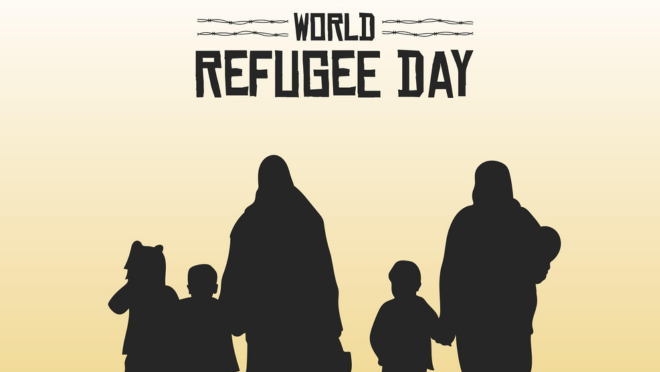World Refugee Day: The challenges away from home
World Refugee Day: The challenges away from home

According to UNHCR, as of mid 2024 there are a total of 122.6 million forcibly displaced people all around the world. From the deserts of Syria to the mountains of Arakan, the behaviours of the state and the animosity towards a particular race or religious group still reflect humanity’s darkest character.
Bangladesh too is a host of such refugee crises. About 926,751 registered Rohingya refugees are hosted in Cox’s Bazar camps, this is the official number counted by UNHCR, other unofficial estimates go well over one million.
More than half of them are children. Like Bangladesh, the majority of the refugees take shelter in neighbouring countries, which pose a significant challenge, as many of the countries that take in refugees themselves are vulnerable economically.
Notably, 71% of refugees are hosted in low- and middle-income countries, and 69% reside in countries neighbouring their countries of origin.
Statistics like this are a growing trend during the last few decades. Rising conflicts, environmental calamities, political upheaval, and plain bigotry are all factors contributing to violence targeted against specific races, nationalities, ethnicities, and faiths.
That is why 20 June has been celebrated as World Refugee Day—to not only focus on creating awareness about the crisis at hand but also emphasise taking tangible actions to mitigate this disaster.
The term “refugee” is quite a new introduction in human history. In the olden days, people would escape any political or religious persecution by just relocating to another society as the concept of new nation states were not yet formed.
They would probably be treated as second-class citizens in their new refuge and have no recognised rights or laws protecting their vulnerable status. This all changed in 1951. The UNHCR 1951 convention agreed upon certain rights and international laws recognising and protecting forcibly displaced individuals, known as refugees, and provided a clear definition under its guidelines.
“A refugee is a person who, owing to a well-founded fear of being persecuted for reasons of race, religion, nationality, membership of a particular social group or political opinion, is outside the country of his nationality and is **unable or, owing to such fear, is unwilling to avail himself of the protection of that country.”
As a result, the status of refugees grants certain unalienable rights to forcibly displaced individuals, including shelter, aid, and support provided by the country of refuge. However, these efforts seldom deterred the country from acting against the refugees to change their policies.
Time and time again, modern conflicts, most recently in the Middle East, have been the reason for millions of Arab nationals to flee their nation and look for safe passage.
The passage to peaceful nations was plagued with geographical challenges, human traffickers, and overall human suffering. During the 2010s, international media was filled with news of the crisis and news of small boats filled with refugees crossing the Mediterranean gained worldwide attention.
In 2024 alone, at least 3,500 people lost their lives or went missing while attempting to cross the Mediterranean Sea to reach Europe, and due to the political upheaval in Central Africa, the Atlantic route also saw mass refugee mobilisation,
Reuters reported that the Atlantic route from West Africa to the Canary Islands has seen a significant increase in fatalities. In 2024, a record 10,457 migrants died attempting this perilous journey.
Not all refugee crises are due to war torn situations, some are targeted and lack any trace of rationality. As seen in the case of the Rohingya population. Over the decades there has been a systematic campaign of ethnic cleansing against the Rohingya population.
The recent influx had taken place in 2017, where mass mobilisation of the Myanmar armed forces in Rakhine displaced hundreds of thousands of Rohingyas, and forced them to leave their homes and take refuge in Bangladesh.
Bangladesh at the moment faced no alternatives but to provide temporary shelter, which today has turned into a camp sealed off from all economic opportunities, education and adequate healthcare.
The Myanmar government does not recognise the Rohingya population as the citizens of Myanmar, a blatant bigoted policy that is yet to be challenged in the international courts due to various geo-political factors.
No matter how much aid or temporary assistance is provided to refugees, it will never be sufficient to provide a quality of life equivalent to their previous standards.
Political turmoil, war or in some cases, prehistoric notions of nationhood are the main culprits still responsible for creating the refugee crisis. This not only is reflected in the mass suffering of the targeted populations, but also plays a hand in destabilising the political environment of the nations these refugees take shelter in.
The recent uptick in nationalistic rhetoric in Europe and all across America can be directly attributed to the increasing refugee population. Although being responsible for creating such sufferings, the so called developed western civilisation often shies away from taking responsibility, moving ahead by only providing aid or other assistance without any just course of action in the ICC or the UN.
As long as the geo-political decision makers do not choose to see this situation for what it is, a dire crisis, the future sadly remains quite bleak for the forcibly displaced.


